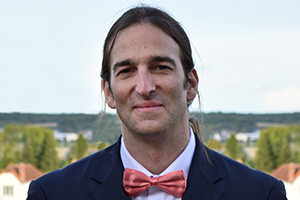Firstbridge courses are offered to degree seeking freshmen and registration is done via webform in pre-arrival checklist.
Professor(s)
Notes
History cannot be understood out of it´s social, political and economic context. Actually, most historical events that required decision making can be explained by the need or the use of resources (food or any other). Science explains how natural resources influence History represents a biological approach to these historical events, consistently tackling to proof that they are not independent from their environmental context.
This course´s schedule and outline are coordinated with its counterpart course Food, Drinks, and Drugs in World History taught by Professor Rosengarten (historian) and is focused on explaining the biological reasons why the historical events portrayed in her course happened.
The course is taught twice a week in two different ways: lectures structured over audiovisual content and flipped teaching, using the student´s findings to deepen into the different lectures.
Learning Outcomes
- Students will comprehend how information is produced and valued in order to discover, evaluate, use, and create information and knowledge effectively and ethically. In FirstBridge, students will demonstrate the conversational nature of scholarship, and recognize their potential role and responsibilities as contributors to that conversation. For each discipline taught in FirstBridge, students will identify reference works, journals, databases and/or major works in history, in order to start effective research in the field. (FB LO1)
- Students will acquire the study skills, time management, and interpersonal skills needed to meet the demands of university-level academic work at a Liberal Arts College individually or as a team. Students will value the multiple meanings of place through experiential learning at AUP and beyond in the Parisian or global context. (FB LO2)
- Students will be able to articulate how environmental conditions have influenced historical and present events.
- Students will be able to articulate how the struggle for life and some limiting factors related to food caused migrations in the past and still do in the present.
- Students will enhance their intercultural understanding of languages, cultures, and histories of local societies and the global issues to which these relate. (CCI LO1)
- Students will think critically about cultural and social difference. Students will identify and understand power structures that determine hierarchies and inequalities relating to race, ethnicity, gender, nationhood, religion or class. (CCI LO3)
- Students will demonstrate awareness of ethical considerations relating to specific societal problems, values, or practices (historical or contemporary; global or local) and learn to articulate possible solutions to prominent challenges facing societies and institutions today so as to become engaged actors at various levels in our interconnected world. (CCI LO4)
Syllabus
Schedule
| Day | Start Time | End Time | Room |
|---|---|---|---|
Tuesday | 13:45 | 15:05 | Q-509 |
Friday | 13:45 | 15:05 | Q-509 |

